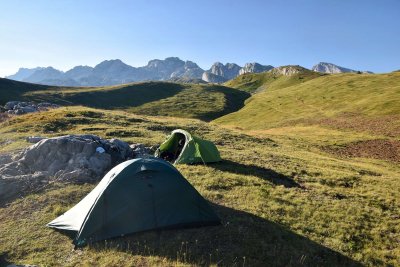The romance of sleeping in the open - the rules of bivouacking in Austria
Sleeping outdoors in the open is the dream of many adventurers and romantics. It's even more of an experience on the crest of the Alps. Waking up with the first rays of the sun, feeling the rustle of the forest and breathing in the fresh mountain air is an experience you won't forget. But bivouacking is not only about adventure, it is also about responsibility towards nature.
Anyone who chooses to spend the night outdoors should take care not to damage nature in any way and leave the place as they found it. Proper behaviour is the key to keeping our footprints invisible in nature.
If you decide to bivouac, keep in mind that after you leave, no one should be able to tell that you have spent the night in that place. It is always important to respect the rules and laws of the country and location you are in.
Rules for bivouacking in Austria
In general, camping in Austria in the forest zone is forbidden. This applies to all federal states and carries heavy fines. The situation is different for bivouacking above the forest boundary. For all Austrian Länder, there is a strict ban on camping in national parks, protected areas, nature reserves etc. as well as in the mountain zone. However, in all countries it is possible to bivouac above the forest boundary in case of injury, danger to life or sudden changes in the weather. Each federal state has its own rules for camping above the forest boundary. Here are the rules of the individual Länder for bivouacking in mountain areas:
Lower Austria (Niederösterreich)
There is a strict ban on camping in Lower Austria, both in the forest and in the mountains. It is advisable to use accommodation facilities in the area, such as campsites, guesthouses or mountain huts. This area includes, for example, the Raxalpe and Schneeberg.
Upper Austria (Oberösterreich)
Unlike Lower Austria, bivouacking above the forest line is permitted here. You can therefore enjoy the beauty of the mountains with a tent. However, camping below the forest line is forbidden. The Totes Gebirge mountains, for example, fall within this area.
Salzburg (Salzburgenland)
In Salzburg, the rules for bivouacking in the mountains are more lenient. It is therefore possible to camp above the tree line. The famous mountains of the area include the Dachstein and the Tennengebirge.
Styria (Steiermark)
Steiermark also allows bivouacking above the tree line, which makes it possible to cross, for example, the Low Tauern or the Ennstal Alps.
Tirol
Tyrol is very strict when it comes to bivouacking in the countryside and it is completely forbidden in the mountains. It is recommended to use mountain huts. Austria's highest mountains, such as the High Tauern and the Stubai Alps, belong to this area.
Carinthia (Kärnten)
Carinthia is also strict when it comes to camping. Tenting is forbidden in the wild, including mountain ranges. This area includes the High Tauern and the Karavanke Mountains.
Vorarlberg (Vorarlberg)
Camping in the mountains is tolerated in Vorarlberg. Local ordinances may regulate the conditions, but in general bivouacking in the mountains is possible. Well-known mountains in the area include the Rätikon and the Verwall.
Burgenland (Burgenland)
This province is on the border with Hungary and has no mountains, so the issue of bivouacking is not relevant here.
How to behave when bivouacking
When bivouacking it is essential to leave the place clean and tidy. You should remove any rubbish left behind, even organic debris that could attract animals. Only build fires where they are allowed and always put them out properly. Respect the peace and quiet of nature so that your presence does not affect the local fauna and flora.
Safety when sleeping outdoors
Safety is key when bivouacking. You should avoid sleeping in avalanche zones, on steep slopes or under rock overhangs where there is a risk of rock slides. Always inform someone of your planned route and sleeping location. Being prepared for rapid weather changes is essential, so always carry suitable clothing and equipment in case of an emergency.
Equipment for bivouacking
For bivouacking, a lightweight and easily portable tent (UL tent - ultra light) is ideal to provide protection from inclement weather. In addition to the tent, you can use a bivvy bag (called a jerkin), which is even more compact and lighter - it is actually another sleeping bag cover that is waterproof and breathable. Other useful tools include a good quality sleeping bag (ideally a down bag, which is extremely insulating and lightweight), a caravan and an emergency sheet. The right equipment will keep you comfortable and safe during a night out in the wild.
By following these rules and recommendations, you can have an unforgettable time bivouacking in the Austrian countryside and help preserve it for future generations.
